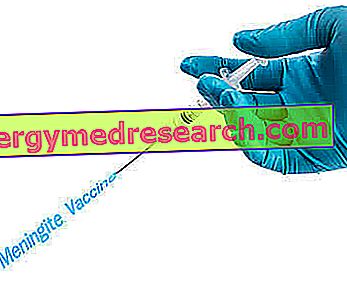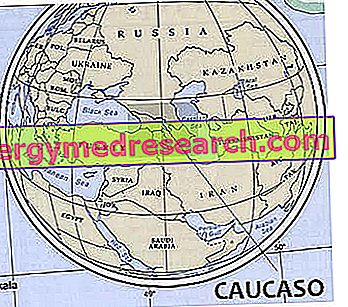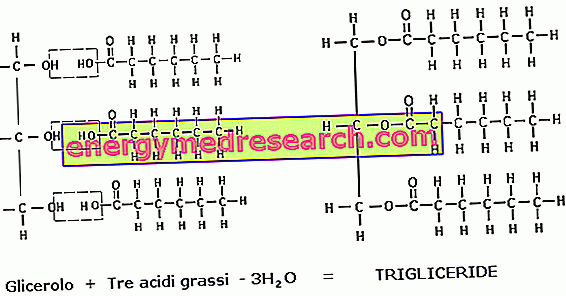Generality
The meningitis vaccine is a preventive measure, useful for reducing the risk of developing the main invasive bacterial forms of the disease.
Meningitis is an inflammation of the membranes lining the brain and spinal cord; this condition depends mainly on infections, but, in rare cases, it can also be caused by irritative processes and some diseases.

At present, to prevent meningitis, vaccines in their monovalent (C and B) or quadrivalent (AC-W135-Y) formulation are the most effective tool to protect against the disease in a lasting way, reducing the risk of a severe course.
What is meningitis
Meningitis is an inflammation of the meninges, that is, of the membranes that enclose and protect the brain and spinal cord.
Usually, this pathology recognizes an infectious cause, but there are also forms caused by irritative phenomena (eg drugs, neoplastic infiltration from primary brain tumors or metastases, physical lesions etc.) and some systemic diseases (such as sarcoidosis and vasculitis).
To learn more: Meningitis - Causes and Symptoms »
The most common forms of meningitis
Infection meningeal inflammation can be caused by viruses, bacteria and fungi.
- Viral meningitis (also known as aseptic meningitis) is quite common and less severe than bacterial forms; Usually, the symptoms are very similar to those of a common flu, it does not lead to serious consequences and the disease resolves within ten days.
- Bacterial meningitis is rarer, but extremely serious and can have lethal consequences. Among the agents that cause meningitis are: Neisseria meningitidis ( meningocco ), Streptococcus pneumoniae ( pneumococcus ) and Haemophilus influenzae type b ( hemophilic B or Hib ).
- Mushroom meningitis (or mycetes) mainly affects people with the strongly debilitated immune system and can lead to life-threatening complications.
How the infection develops
The meninges are normally sterile and represent a warm and nutrient-rich environment, therefore ideal for the colonization of pathogenic microorganisms coming from the outside (as in the case of penetrating traumas or neurosurgical maneuvers) or from adjacent foci of infection (eg sinusitis and pneumonia ). In the latter case, special circumstances are necessary, such as the lowering of the immune system or the concomitant presence of other pathologies (eg tuberculosis, measles, rubella, chicken pox etc.), which allow bacteria and viruses to reach the meninges through blood and cerebro-spinal fluid (or liquor, which is the fluid that permeates and protects the brain and spinal cord). The incubation period varies between 3 and 4 days, but can be extended up to 10 days (maximum time provided for health surveillance ).
Contagion
Everyone can get meningitis, but young children and adolescents are more likely to get the infection caused by different types of meningococcus. The elderly, those suffering from immune deficiencies and other chronic diseases are also at risk.
Transmission of infective meningitis occurs after prolonged and close contact with people with the disease or healthy carriers. The infection can occur by air (using droplets of saliva and dispersed nasal secretions, talking, coughing or sneezing) or through the direct contact of biological fluids (eg drinking from the same glass or eating with the same cutlery as a person who has contracted the disease).
Exposure to the causative agents does not necessarily imply the development of meningitis: in fact, the state of carrier is frequent, that is of a completely asymptomatic and transient healthy individual, which does not develop the disease.
Symptoms and Complications
Typical symptoms of meningitis include: neck and neck stiffness, high fever, headache, nausea and vomiting, diffuse skin patches, severe weakness and prostration, altered consciousness and convulsions. In infants and small children, the disease can occur, especially in the early stages, with more nuanced signs, such as lack of appetite, irritability and low-grade fever.
In some cases, meningitis has a fulminant course, which can even lead to death within a few hours. Other times, the disease has serious and debilitating consequences (brain damage, deafness, epilepsy, vision problems, paralysis and neuro-motor deficit). Furthermore, if the bacterium reaches the blood, it can affect other organs, resulting in an even more serious clinical picture ( sepsis ).
To learn more, read: Symptoms Meningitis
Diagnosis
The diagnosis of meningitis is confirmed by the cytochemical and cultural analysis of the CSF taken through the lumbar puncture (that is, by placing a needle in the lower back, through the spine) and by molecular biology tests.
Treatment
The therapy of meningitis is conditioned by the causative agent, the age of the patient and the severity of the symptoms. In the case of viral forms, for example, symptoms generally resolve during a week, without the need for any specific therapy, but only as a support.
Meningococcal meningitis, on the other hand, represents a medical emergency that must be managed promptly with massive doses of specific intravenous antibiotics in hospital settings.
In any case, the treatment must be started as early as possible to avoid serious permanent outcomes (deafness, loss of one or more limbs, visual disturbances, neuro-motor deficits) and death. The mortality rate of all types of meningitis is around 10% of cases.
Vaccines available
Vaccination is the most effective way to combat the spread of infection and prevent disease, as it promotes the induction of an immune memory and the formation of antibodies that defend the body.
Currently, vaccines are available that protect against the most frequent and important bacterial forms of meningitis:
- Hemophilus B : the vaccine is included in the hexavalent vaccine (which also offers protection against diphtheria-tetanus-pertussis, poliomyelitis and hepatitis B), whose first dose is given as early as the 61st day of life (third month).
- Pneumococcus : a vaccine is available, practicable from the first months of life, which protects from 13 different strains of Streptococcus pneumoniae .
- Meningococcus : there are three types of vaccine:
- The conjugated vaccine against meningococcus C (it is the most frequently used and protects only from serotype C): it consists of the polysaccharide of the capsule of the "conjugated" bacterium on a protein that allows the induction of immune memory prolonged over time, in addition to the development of short-term antibodies. The Ministry of Health recommends its administration to all newborns between the 13th and 15th month of life; this vaccine is also indicated for all adolescents not previously vaccinated.
- The tetravalent vaccine that protects against ACY-W135 serotypes : it is recommended for adolescents and people traveling in regions where the infection is circulating. The conjugate version of this vaccine can be administered starting from 12 months of life, while the polysaccharide version (containing only the polysaccharides of the serotype capsule A, C, Y and W135) is indicated beyond two years of age.
- The conjugate vaccine against meningococcus type B (protects only against this serotype): it can be used starting from two months of age, but currently there is no recommendation for vaccination of all children in the national territory.
Indications
For whom vaccination is recommended

Some vaccines are recommended and offered for free; others will be, instead, as soon as the new National Vaccine Prevention Plan (PNPV) will come into force.
To date, the vaccination schedule includes vaccination against meningococcus C in children who are at least one year old, while a booster with tetravalent vaccine is recommended for adolescents.
The tetravalent conjugated anti-meningococcal ACY-W135 vaccine is also suggested for adolescents who have not been vaccinated from small, and for those who go to countries where the serotypes contained in the vaccine are present.
The meningococcal B vaccine, currently offered in some regions in the first year of age, will probably soon be recommended for younger children nationwide.
Outside the two age groups mentioned above, the vaccine is strongly recommended :
- In people suffering from some pathologies : ex. thalassemia (Mediterranean anemia), sickle cell anemia, renal failure, chronic liver disease, functional or anatomical asplenia (absence of the spleen), type 1 diabetes mellitus, congenital or acquired immunodeficiencies, etc .;
- In the presence of particular conditions : eg infants who attend nursery schools, children living in communities, young people who go to discos, military recruits and for anyone who has to go to areas where meningococcal disease is common;
- During epidemics .
For adults who have not been vaccinated against meningococcus during childhood, vaccination is not recommended, unless the aforementioned risk factors are present.
How to administer it
Meningitis vaccines are given as an intramuscular injection . In newborns, this is preferably done in the anterolateral region of the thigh, whereas in older children, adolescents and adults in the deltoid muscle. To induce effective protection, one or more doses may be required.
How much
Which vaccines are free and which are free?
- Vaccination against Streptococcus pneumoniae (pneumococcus) is offered free of charge and should be administered in 3 doses, at the third, fifth and eleventh month of the child's life.
- As regards Haemophilus influenzae B, immunization is planned in conjunction with other mandatory vaccines in the first years of age (ie together with antitetanus, antidiphtheria, anti-pertussis, anti-polio and anti-hepatitis B), administered free of charge for the third, fifth and eleventh month of life of the child, as expressly indicated in the Italian vaccination calendar. No further calls are necessary.
- Vaccination against meningococcus C ( Neisseria meningitidis C) is free and involves the administration of a single dose between the 13th and 15th month of life, but is also recommended for adolescents susceptible to infection. For those who have been vaccinated during childhood, the need for a 6 and 15 year old recall is being studied.
- The meningococcal B vaccine is free only in some regions and involves different doses, depending on the age at which vaccination is started. For example, a 4-dose protocol (3rd, 4th, 6th and 13th month of life) is generally followed before the child's 6 months of life. At the moment, the vaccine is offered for free only in some regions, but the offer is expected to be extended nationally.
For the vaccine against other bacteria that cause meningitis, the vaccination offer varies from region to region. In the age in which it is not provided for free, these vaccinations are still made available by appointment with a prescription and can be purchased at the pharmacy at the price provided by the regional vaccination schedule . The costs may vary, but indicatively the anti-meningococcus B costs 150 euros per dose (two are needed) and the one against serotype C costs about 70 euros.
Side effects
Vaccines against meningitis have a good safety and tolerability profile ; however, as with any other vaccination, their administration may be associated with undesirable side effects, including mild pain and swelling at the injection site .
Systemic reactions are rarer and include moderate intensity fever, drowsiness, headache and general malaise. Usually, these effects appear and resolve within a few days.
In children, on the other hand, vaccination can lead to general adverse reactions, such as fever, vomiting, diarrhea, loss of appetite, drowsiness or irritability. Rarely, seizures, hypotonia and allergic-type reactions may occur.
Contraindications
The administration of the vaccine is contraindicated in subjects suffering from an acute febrile condition and if a serious hypersensitivity (anaphylaxis) has previously occurred to the active principles of the same or to any of the excipients.
Like any vaccine, even the one against meningococcus, it does not guarantee 100% protection, but it seems that this preventive measure is nevertheless able to attenuate, if contracted, the infection and reduce its intensity. Furthermore, the immunity conferred by the vaccine may decrease with time, so calls should be made with an indicative frequency of ten years.
Antibiotic prophylaxis or vaccination?
Prophylaxis consists of a specific antibiotic therapy, on the prescription of the health authority, for the type of germ responsible; it must be started within 48 hours of contact with a person who has contracted meningitis. In other words, this protocol represents an emergency measure : if implemented promptly, the prophylaxis practiced in an adequate manner limits the probability of developing the disease and its consequences.
All persons who have had close contact, one to two meters apart and in closed environments, with a person suffering from meningitis in the ten days prior to the onset of symptoms must be subjected to this treatment.
The vaccine against meningitis serves instead to protect the disease in a lasting way and contributes greatly to reducing cases of disease, but it is necessary to make calls for the vaccine within the established times.
Prevent meningitis
The bacteria that cause meningitis, especially meningococcus, cannot live long outside the human body and are very sensitive to common disinfectants, temperature changes and drying; therefore the disease is transmitted less easily than a cold or flu.
Being the inter-human contagion, the risk of contracting meningitis can be reduced by implementing some measures of personal hygiene and protection :
- Avoid closed and crowded places, and close contact with people;
- Do not exchange objects for personal use (glasses, cutlery, cigarettes, soft non-washable toys, etc.);
- Keep the surfaces that may be contaminated clean (switches, telephones, keyboards, handles, faucets, elevator control panels, tables and desks);
- Ventilate the rooms where people live and work often, especially if the premises are very busy (barracks, kindergartens, schools, etc.);
- Wash your hands carefully and several times a day with soap and water, especially after coughing or sneezing.



